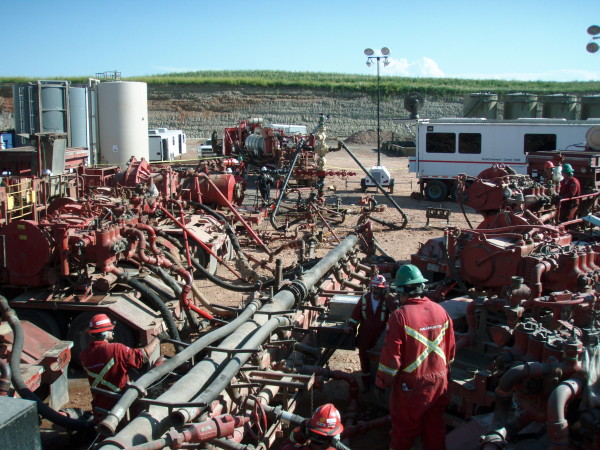“Fracking or hydraulic fracturing is the fracturing of rock by a pressurised liquid in which typically water is mixed with sand and chemicals, and the mixture is injected at high pressure to create small fractures to extract such as gas and oil.
Proponents of hydraulic fracturing point to the economic benefits from the vast amounts of formerly inaccessible hydrocarbons the process can extract. Opponents point to potential environmental impacts, including contamination of ground water, depletion of fresh water, risks to air quality, the migration of gases and hydraulic fracturing chemicals to the surface, surface contamination from spills and flow-back, and the health effects of these. For these reasons hydraulic fracturing has come under international scrutiny, with some countries suspending or banning it. However, some of those countries, including most notably the United Kingdom,have recently lifted their bans, choosing to focus on regulations instead of outright prohibition. Documented groundwater contamination has occurred from seepage of the stored water from the hydraulic fracturing from unlined surface ponds. The 2013 draft EU-Canada trade treaty includes language outlawing any “breach of legitimate expectations of investors” which may occur if revoking drilling licenses of Canada-registered companies in the territory of the European Union after the treaty comes into force”.(Wikipedia). Furthermore “…studies confirm that processes linked to the extraction of oil and gas through hydraulic fracturing, or fracking, can trigger man-made earthquakes.”
The village of Balcombe in Sussex has seen battles with Police, people attempting to block the first drillings and a politician making a remarks that “fracking should be taken to the ‘desolate’ North East of England”, that is, to less affluent pastures.
A less publicised event has been the closure of a Twitter account related to this campaign. According to activists the account @frackfighterUK managed one tweet announcing a fire-engine had been used to block the entrance to the work site before it was suspended. The account then disappeared and all links to photos proving its existence were broken.
If it is so easy to take down a Twitter account, it should be equally easy to suspend other social media when, rather than posting inconvenient campaigns, they are the tools employed by trolls and cyberbullies.
Instead, there has been an increase in reporting examples of people being threatened and intimidated by these relatively anonymous internet thugs. There have even been suicides following such campaigns of harassment, followed by an increase of bullying of a victim’s sibling.
Not only teenage bullying: “Any woman who has ever ventured an opinion on the internet has experienced abuse, sometimes of the “Piss off back to the kitchen, love” variety, occasionally of the “Why so uptight? You need a shag” flavour, and, from time to time, a good old-fashioned rape threat. This is neither new nor news, nor is it acceptable, and it is to the enormous credit of activist Caroline Criado-Perez and MP Stella Creasy that they have offered themselves up as sacrificial lambs to protest against this and, in doing so, received hundreds of extremely abusive messages themselves. Social change comes from someone standing up and insisting the status quo – accepted unthinkingly by so many as “just the way things are” – is intolerable, and Criado-Perez and Creasy have shone a light on the weird misogyny, racism, antisemitism, homophobia and all those other unpleasantries that have always flowed unimpeded on the internet.” The Guardian
Calls to also understand the mental mindset of the people who commit such acts have met with derision, but it is important to see that cruelty is not innate; it develops as part of a system that is cruel towards its less fortunate members (e.g., those living in the North East of England?). This is not a justification for heinous actions but an invitation to take a long hard look at how they can be prevented. Closing accounts, banning sites, avoiding anonymity (more easily done when the system is being threatened by alternative views than when individuals are being harassed) cannot replace attempts at making our society less violent in general. As long as the “heroes” and the “successful” are those who promote wars and make money at the expense of everybody else and the environment, cruelty will continue to “surprise” us when it raises its ugly head.










